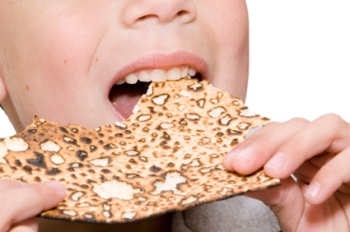In the laws of Hametz and Matzah (6:12), Maimonides writes:
אָסְרוּ חֲכָמִים לֶאֱכֹל מַצָּה בְּעֶרֶב הַפֶּסַח כְּדֵי שֶׁיִּהְיֶה הֶכֵּר לַאֲכִילָתָהּ בָּעֶרֶב. וּמִי שֶׁאָכַל מַצָּה בְּעֶרֶב הַפֶּסַח מַכִּין אוֹתוֹ מַכַּת מַרְדּוּת עַד שֶׁתֵּצֵא נַפְשׁוֹ
The sages have forbidden the eating of matzah on the day preceding Pesaḥ, so it will be obvious when people eat Matzah at night that it is for the sake of the Mitzvah. And if one ate matzah on Erev Pesah, he gets lashes until he dies.
This Halakha is a bit scary. Where di Maimonides get it from?
From the Yerushalmi (Peshaim 2:7):
א”ר לוי האוכל מצה בערב הפסח כבא על ארוסתו בבית חמיו והבא על ארוסתו בבית חמיו לוקה
Rabbi Levi said, one who eats Matzah on Erev Pesah is like one who has intercourse with his betrothed in the house of his father-in-law. And one who has intercourse with his betrothed in the house of his father-in-law is lashed.
So, we have found the source for Maimonides’ ruling, but the problem just got more complicated. We now have to understand two things:
- What is the source for the statement of Rabbi Levi? Is it a rabbinical decree? If so, where is it mentioned and why is Rabbi Levi the only one who reports it? Why is it not phrased as a decree: “The rabbis decreed that one should not… etc.”?
- How did Maimonides make the leap from lashes to capital punishment? The Talmud Yerushalmi says only that one gets lashes, but not that they are going to be lethal?
The second question was discussed at length by Maimonides’ commentators, but if we would have thought that they would challenge Maimonides, we are in for a surprise. Most of them tend to uphold his ruling.
Rabbenu Nissim of Gerona (1320-1380), writes in his commentary on the Ri”f (Ketubbot 16:2):
פירש הערוך מלקות דאורייתא הוא על חייבי לאוין באומד… אבל עובר על מצות עשה כגון סוכה ולולב ואינו עושה היו מכין אותו עד שתצא נפשו בלא אומד… וכן עובר על דברי חכמים היו מכין אותו בלא מספר ובלא אומד… נראה מדבריו דמכת מרדות הוא עד שתצא נפשו ואף הרמב”ם ז”ל כתב בפ”ו מהל’ חמץ ומצה אסרו חכמים לאכול מצה בערב פסח כו’ ומי שאכל מצה בע”פ היו מכין אותו עד שתצא נפשו ולפי דבריהם יש בזה חומר בדברי סופרים יותר מדברי תורה
The Arukh (by R. Nathan of Rome, 1035-1106) explains that by biblical law lashes are given for the transgression of a prohibition, based on assessment [of how many lashes can a person withstand]… but if one does not want to fulfill a commandment, such as Sukkah and Lulav, he would be lashed until he dies, without assessment… and one who transgresses the ruling of the rabbis is also lashed with no quantity or assessment… and it seems from his words that מכת מרדות – lashes of rebellion are until one dies, and so wrote Maimonides regarding Matzah on Erev Pesah. According to them, transgressing the rabbis’ ruling is more severe than transgressing biblical commandments.
Rabbenu Nissim’s answer is still not satisfying, and Rabbi Haim of Brisk (1853-1918) tries to answer it, in the typical method of the Brisker school, in his commentary on the Talmud (Menahot, 41:1):
משמע דאין כאן חיוב הכאה על הגברא בעד שעבר באיסור דרבנן אלא הוא רשות לבי”ד להכותו, וכעין שבי”ד מכין למיגדר מילתא בתורת כפיה
It seems that the obligation of lashes is not connected to the person who committed transgression (meaning that he must receive lashes) but rather a license to the court to administer lashes in order to establish rabbinical law.
In other words, R. Haim wants to say that these lashes can be avoided, but it is hard to see that in Maimonides’ words.








Ohr HaChaim Yomi – Emor